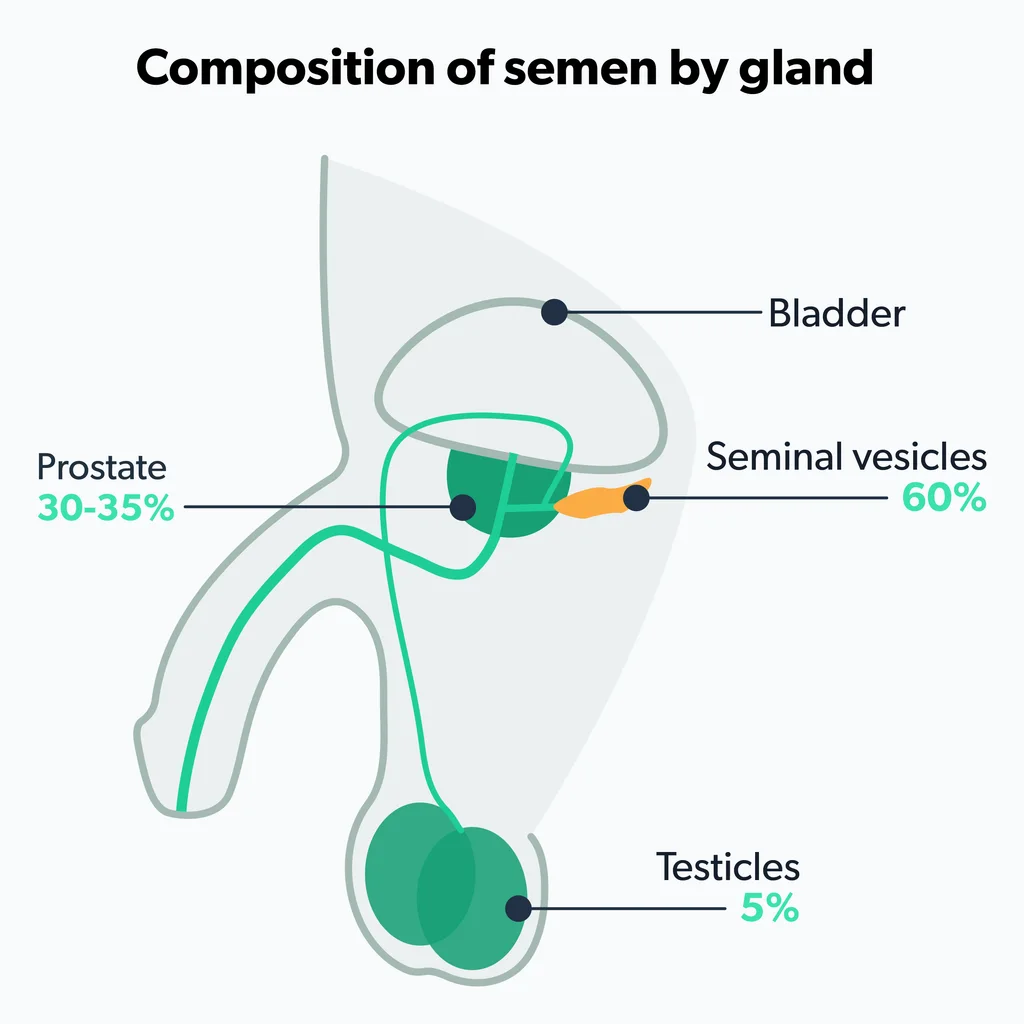Here's what we'll cover
Much like penis shape and penis size, semen volume may be a source of pride, insecurity, confusion, and even anxiety for some men.
If you compare yourself to porn stars (rarely a good idea), who seem to “cum” huge amounts of semen, you may fear you’re falling short. Or your anxiety could stem from the idea that ejaculation volume is connected to fertility, masculinity, or virility. Last but not least, you may believe that a large ejaculation volume is related to the quality of a sexual experience for yourself or your partner(s).
The bottom line is this: your ejaculate is probably fine. But here's what you need to know about the science of semen volume, how to increase semen volume, and when you might want to consult a healthcare provider about it.
4 ways to produce more semen
If you’re looking for definitive strategies or medications as an answer to the age-old question, “how to cum more”, there’s no such thing. But there is one low-tech, no-cost thing you can try to increase your semen volume.
1. Abstain from ejaculating
Frequent masturbation and sex can reduce the volume of your ejaculation. If you hold off for a few days, chances are your semen volume will increase. One study found that for the first four days after ejaculation, semen volume increases by about 12% each day you don’t ejaculate.
2. Edging
If you want to increase your semen volume even more, try edging—stimulate your penis right up to the point of ejaculation, but stop right before you come. Repeat this process for as long as you can (or as long as it’s enjoyable). If you do it a couple of times, and you’ll eventually have an orgasm, you may see more semen coming out of your penis. Edging can be done solo or with a partner to stretch out how long you last in the bedroom.
3. Stop smoking
There are many reasons to stop smoking for your health, and improving your sexual function is one of them. One study evaluated the ejaculation of 889 men––522 non-smokers and 367 smokers. The study found that while smoking had no impact on sperm concentration of reproductive hormone levels, smokers had less semen volume than non-smokers, with less semen volume the more cigarettes they smoked. And if you need another reason to quit, smoking cigarettes has been shown to contribute to erectile dysfunction.
4. Pelvic floor exercises
One factor that affects ejaculation is the muscles of your pelvic floor, which are the muscles that line the bottom of your pelvis. If your pelvic floor muscles are weak, it makes sense that the spasms that push your semen out when you orgasm may not be strong enough to expel all of your semen. One method for exercising your pelvic floor involves squeezing and releasing your muscles as you pee to stop and start your stream.
While there haven’t been any studies examining the link between pelvic floor exercise and semen volume per se, the techniques have been shown to improve symptoms of premature ejaculation as well as the risk of bladder leakage as you age.
Can supplements increase your semen volume?
Online or in vitamin stores, you'll find numerous supplements that claim to boost various aspects of masculinity and male sexual health, from penis size to testosterone level to semen production.
Some supplements that have been touted as having semen-boosting properties include lecithin, zinc, vitamin D3, ashwagandha, maca, fenugreek, amino acids, and D-aspartic acid. You may have read anecdotal online testimonials about them individually or combined into brand-name supplements with "snazzy" names like Semenax.
However: "There is no FDA-approved pill that can increase your ejaculate volume," says Seth Cohen, MD, MPH, a urologist with NYU Langone Health in New York City. "If a patient came to me and said they wanted to take a supplement to try it, I would say, go ahead. But if they said, 'Show me a robust, randomized, placebo-controlled trial that shows ashwagandha increases semen volume,' I would say it doesn't exist."
What is seminal fluid?
If you want to know how to increase semen, what you actually have in mind is seminal fluid. Many men think semen and sperm are interchangeable terms, but very little of semen is actually made up of sperm. Sperm are the swimming cells that carry genetic information and fertilize an egg to make a baby. Semen––the fluid that carries the sperm––is a fairly elaborate co-production that incorporates the testicles, the prostate, the seminal vesicles, and the bulbourethral glands
The seminal vesicles—two saclike glands behind the bladder—secrete about 50% to 65% of the fluid that becomes semen.
The prostate gland produces prostatic fluid, which nourishes and transports sperm; it produces about 20% to 30% of semen volume.
Just 5% is sperm, which is produced in the testicles.
Finally, the bulbourethral glands (also known as the Cowper's glands)—pea-sized glands near the base of the penis—secrete a lubricating fluid that tops things off.

When ejaculating, men produce about 1.5 ml to 5 ml of semen. On the upper end, that's about a teaspoon.
Does more semen mean you have better sperm?
In most cases, sperm health—including sperm count and sperm motility—is not related to the amount of semen production. People who are bigger shooters aren't inherently more fertile than people who are decent dribblers.
One caveat: some people who have infertility because of a low sperm count may experience low semen volume, too. But one does not necessarily indicate the other.
Semen volume and sex
Likewise, the amount of semen you shoot is not related to how good you are in bed. Don't believe it? Let's take a look at some studies.
A 2018 study published in the Journal of Sexual Medicine was reportedly the first on how male ejaculation volume and intensity affect women's pleasure and orgasms during sex. The study surveyed 240 sexually active heterosexual women and found that:
Only 13% of the women considered the quantity of their partner's expelled ejaculate to be a reflection of their own sexual attractiveness.
Only about half of women thought it was "very important" that their partner ejaculated during sex at all.
If you're in a relationship that involves two penises, you might compare your semen volume to your partner's. If you're worried you don't measure up, remember that semen volume is not a measure of sexual vitality or a sign that you're really into someone. We're willing to bet your partner doesn't give it a second thought.
What causes changes in semen volume?
A number of things can cause changes in the volume of your ejaculate. The first is simply age. "When you were a young guy just going through puberty, that's probably the most semen you're ever going to ejaculate in your life," says Cohen. "Slowly, over decades, that volume will go down."
Here's why: "Everybody knows as men get older, your prostate grows. And as the prostate grows, it becomes a little bit more difficult to pee," says Cohen. "The other thing that happens is the prostate loses the vascular (blood vessel) cells that make it such a juicy organ that provides all this seminal fluid." The result: Lower semen volume.
Cohen says he rarely sees young patients in his practice who are concerned about low semen volume. Instead, he gets about one query a week from older men (usually over 50) who've noticed a consistent reduction in their semen volume for several months to a year. This warrants investigation because it could indicate a prostate issue that needs to be addressed.
Some conditions that can cause changes in the volume of ejaculate, says Cohen, include:
Benign prostatic hyperplasia, or BPH: An enlargement of the prostate that can also cause difficulty urinating, frequent or more urgent urination, or a weak stream
Prostatitis: Inflammation of the prostate that might also cause the color, consistency, and smell of semen to change.
If you're concerned about your semen volume, it's a good idea to consult a healthcare provider who can take a thorough medical history and conduct a full physical exam. Instead of looking for magic bullets to improve your sex life and sexual function, remember that all aspects of your sexual health will be better when you are healthy.
Making lifestyle changes like eating a balanced, nutritious diet, getting regular exercise, reducing stress, avoiding tobacco and recreational drugs, and drinking alcohol in moderation or not at all can improve your cardiovascular and overall well-being. That can increase blood flow, the quality of your erections, and the amount of energy you have for sex, which can only increase the odds you (and your partner, if applicable) will have a good time in bed.
DISCLAIMER
If you have any medical questions or concerns, please talk to your healthcare provider. The articles on Health Guide are underpinned by peer-reviewed research and information drawn from medical societies and governmental agencies. However, they are not a substitute for professional medical advice, diagnosis, or treatment.
Burri, A., Buchmeier, J., & Porst, H. (2018). The importance of male ejaculation for female sexual satisfaction and function. The Journal of Sexual Medicine, 15(11), 1600–1608. doi: 10.1016/j.jsxm.2018.08.014. Retrieved from https://www.jsm.jsexmed.org/article/S1743-6095(18)31158-5/fulltext
Carlsen, E., Petersen, J. H., Andersson, A. M., & Skakkebaek, N. E. (2004). Effects of ejaculatory frequency and season on variations in semen quality. Fertility and Sterility, 82(2), 358–366. doi: 10.1016/j.fertnstert.2004.01.039. Retrieved from https://www.fertstert.org/article/S0015-0282(04)00877-5/fulltext
Lawrentschuk, N. & Perera, M. (2016). Benign prostate disorders. Endotext. Retrieved on Oct. 9, 2020 from https://www.ncbi.nlm.nih.gov/books/NBK279008
McKay, A. C., Odeluga, N., Jiang, J., et al. (2020). Anatomy, abdomen and pelvis, seminal vesicle. StatPearls. Retrieved on Oct. 9, 2020 from https://www.ncbi.nlm.nih.gov/books/NBK499854/
National Institutes of Health. (n.d.). Semen analysis: MedlinePlus Medical Encyclopedia. Retrieved on Aug. 12, 2020 from https://medlineplus.gov/ency/article/003627.htm
Pasqualotto, F. F., Sobreiro, B. P., Hallak, J., et al. (2006). Cigarette smoking is related to a decrease in semen volume in a population of fertile men. BJU International, 97(2), 324-6. doi: 10.1111/j.1464-410X.2005.05906.x. Retrieved from https://pubmed.ncbi.nlm.nih.gov/16430638/
Pastore, A. L., Palleschi, G., Fuschi, A., et al. (2014). Pelvic floor muscle rehabilitation for patients with lifelong premature ejaculation: a novel therapeutic approach. Therapeutic Advances In Urology, 6(3), 83-8. doi: 10.1177/1756287214523329. Retrieved from https://pubmed.ncbi.nlm.nih.gov/24883105/
Roberts, M. & Jarvi, K. (2009). Steps in the investigation and management of low semen volume in the infertile man. Canadian Urological Association Journal = Journal de l'Association des urologues du Canada, 3(6), 479–485. doi: 10.5489/cuaj.1180. Retrieved from https://cuaj.ca/index.php/journal/article/view/1180










